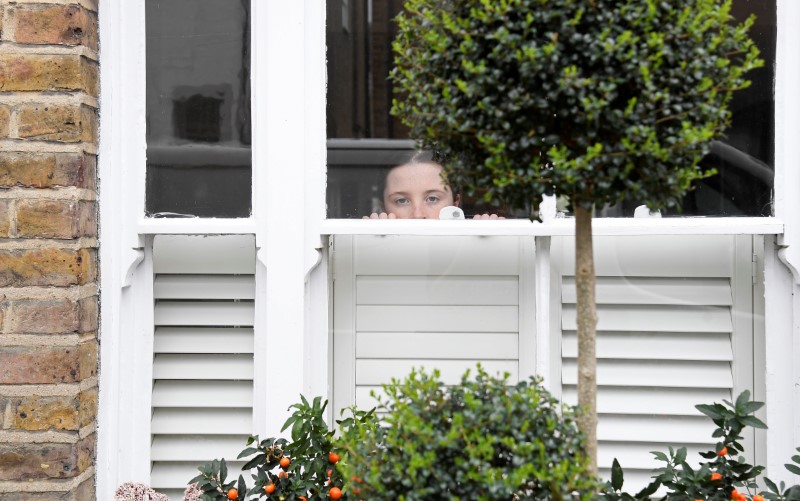By Kate Kelland
LONDON (Reuters) - It's a bit like tag, except that you get tagged when someone coughs on you and that means you have the virus and have to go into isolation. If you come out and get tagged again, you die.
Child psychotherapists say playground games in the time of COVID-19 are becoming infused with words that many of the children playing them had never heard before: pandemic, isolation, lockdown.
So while the disease caused by the new coronavirus appears to produce relatively mild symptoms in many children, doctors and psychologists warn the impact of the outbreak and its anxiety-inducing spread may be far more traumatic.
"I'm worried we could develop a generation of children with health anxiety," said Nikhil Chopra, a family doctor and father of two girls, aged 2 and 4, living in southern England.
His 4-year-old, normally playful and worry-free, he said, was coming home from school last week saying: "If we don’t wash our hands we could die."
A psychotherapist who works with children in London said the games and playground talk among young children sharply reflect the new world.
Describing the coronavirus tag game, where "if you're tagged you have to stand at one end of the playground in isolation, and if you come out and get tagged again, you die", the therapist said fear and confusion were leading some kids to lash out.
"There's quite a lot of ethnic diversity in the school I work in, and the Chinese children are being victimized and bullied - they are being told they're "unclean" and "revolting" because "they eat dogs and snakes". It's so sad. The children are not bad, but their fear is so great that the only thing they can do is project it onto others to gain a sense of control."
NERVOUS AND BRAVE
Across the Atlantic, 4-year-old Asher Henkoff says he's fine when asked how the pandemic is affecting him: "I have my stuffed animals to keep me company, and I get to watch TV," the Houston, Texas boy said, adding he feels "nerv-brave" - a mix of nervous and brave.
His mother, Alexandra Wax, says Asher has become uncharacteristically clingy, is asking non-stop questions about the new virus and has begun having accidents during the night - something he hasn't done in years.
While some young minds will be resilient and enable those children to bounce back after the crisis, the risk for others, psychotherapists say, is that the anxiety they see around them now will impact their mental growth and future lives.
"Adults panicking is going to mean children panicking because they will be feeling very unsafe," said Lucy Russell, a clinical psychologist in southern England and author of an online child mental health blog called "They are the Future".
"I'm most worried not because of the distress I'm seeing in children right at this moment, but because of the distress I'm seeing in adults and how that will be transmitted to children."
Russell and other mental health specialists such as Mary Calabrese, a Cambridge, Massachusetts-based child psychologist, say traumas like the global coronavirus pandemic can affect children particularly strongly.
Because their brains are still forming, trauma can cause the amygdala - the emotional part of the brain linked to fear and anxiety - to over-react at a time when its link to the frontal cortex - the thinking and more rational part of the brain - is not fully developed.
"The connections aren't strong," Russell said. "So young children tend to react emotionally to things - and the thinking, rational part of the brain can't calm them down."
Calming becomes a job for adults - parents, neighbors, teachers and friends - said Russell and Calabrese.
Acknowledging how hard this can be for parents and carers whose own lives are filled with anxiety and uncertainty, the specialists advise creating as much structure and predictability as possible to help children feel secure and safe.
And because children's minds are geared toward problem-solving, they might also respond well to reassurance that focuses on what can be done to control the spread of the virus - like washing hands and staying inside.

"Validate their fears without making it worse," Calabrese said. "You might want to say: 'Let's find out together what this means'. Pull it away from them personally, and say: 'This is why we all owe it to each other to socially distance'."
(Reporting and writing by Kate Kelland in London. Additional reporting by Nick Brown in New York; Editing by Janet Lawrence)